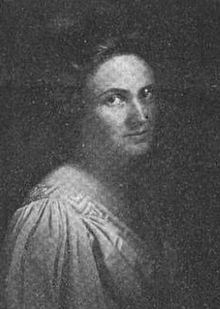Marion Craig Wentworth
| Marion Craig Wentworth | |
|---|---|

Wentworth on the cover of The Socialist Woman magazine, April 1908.
|
|
| Born | 1872 Minnesota, U.S. |
| Died | 1942 |
| Alma mater |
University of Minnesota Curry College |
| Known for | Playwright, Poet |
Marion Craig Wentworth (1872–1942) was an American playwright, poet, and suffragist. She is best known for her feminist anti-war play, War Brides, which was made into a silent film starring Alla Nazimova in 1916.
She was born in Minnesota in 1872 and graduated from the University of Minnesota in 1894. She later studied at the Curry School of Expression (now Curry College), and stayed on in Boston to teach expression. She married in 1900, had a son, and divorced in 1912.
Wentworth was a socialist and a feminist whose writing often addressed social issues. Her 1912 play, The Flower Shop, takes up the cause of women's suffrage. In the years leading up to World War I, she traveled the country to raise support for the suffrage movement by giving dramatic readings. She often read from Votes for Women!, a pro-suffrage play by Elizabeth Robins, portraying multiple characters that ranged from "the doughty women's trade union leader with the cockney dialect" to "the bright, little, pertinacious middle-class 'Suffragette,' with her high-pitched volubility on the platform". In April 1908 she was featured on the cover of The Socialist Woman, a magazine edited by Josephine Conger-Kaneko, who considered her "among the best women artists of the Socialist movement."
In addition to readings, she also gave lectures. In March 1915 she addressed a meeting of the Boston Equal Suffrage Association for Good Government; the other speakers were Julia Lathrop, director of the U.S. Children's Bureau, and Boston NAACP president Butler R. Wilson.
In 1915 Wentworth published her best known play, War Brides, in which a pregnant war widow commits suicide rather than bear more children for a nation that allows her no say in its decision-making. At one point she confronts an army captain, arguing,
You tear our husbands, our sons from us—you never ask us to help you find a better way—and haven't we anything to say?...If we can bring forth the men for the nation, we can sit with you in your councils and shape the destiny of the nation, and say whether it is to war or peace we give the sons we bear.
...
Wikipedia
